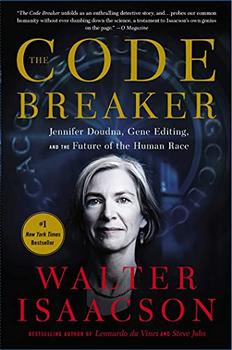Summary | Excerpt | Reviews | Beyond the Book | Readalikes | Genres & Themes | Author Bio

Jennifer Doudna, Gene Editing, and the Future of the Human Race
by Walter IsaacsonIntroduction
Into the Breach
Jennifer Doudna couldn't sleep. Berkeley, the university where she was a superstar for her role in inventing the gene-editing technology known as CRISPR, had just shut down its campus because of the fast-spreading coronavirus pandemic. Against her better judgment, she had driven her son, Andy, a high school senior, to the train station so he could go to Fresno for a robot-building competition. Now, at 2 a.m., she roused her husband and insisted that they retrieve him before the start of the match, when more than twelve hundred kids would be gathering in an indoor convention center. They pulled on their clothes, got in the car, found an open gas station, and made the three-hour drive. Andy, an only child, was not happy to see them, but they convinced him to pack up and come home. As they pulled out of the parking lot, Andy got a text from the team: "Robotics match cancelled! All kids to leave immediately!"
This was the moment, Doudna recalls, that she realized her world, and the world of science, had changed. The government was fumbling its response to COVID, so it was time for professors and graduate students, clutching their test tubes and raising their pipettes high, to rush into the breach. The next day—Friday, March 13, 2020—she led a meeting of her Berkeley colleagues and other scientists in the Bay Area to discuss what roles they might play.
A dozen of them made their way across the abandoned Berkeley campus and converged on the sleek stone-and-glass building that housed her lab. The chairs in the ground-floor conference room were clustered together, so the first thing they did was move them six feet apart. Then they turned on a video system so that fifty other researchers from nearby universities could join by Zoom. As she stood in front of the room to rally them, Doudna displayed an intensity that she usually kept masked by a calm façade. "This is not something that academics typically do," she told them. "We need to step up."
It was fitting that a virus-fighting team would be led by a CRISPR pioneer. The gene-editing tool that Doudna and others developed in 2012 is based on a virus-fighting trick used by bacteria, which have been battling viruses for more than a billion years. In their DNA, bacteria develop clustered repeated sequences, known as CRISPRs, that can remember and then destroy viruses that attack them. In other words, it's an immune system that can adapt itself to fight each new wave of viruses—just what we humans need in an era that has been plagued, as if we were still in the Middle Ages, by repeated viral epidemics.
Always prepared and methodical, Doudna (pronounced DOWDnuh) presented slides that suggested ways they might take on the coronavirus. She led by listening. Although she had become a science celebrity, people felt comfortable engaging with her. She had mastered the art of being tightly scheduled while still finding the time to connect with people emotionally.
The first team that Doudna assembled was given the job of creating a coronavirus testing lab. One of the leaders she tapped was a postdoc named Jennifer Hamilton who, a few months earlier, had spent a day teaching me to use CRISPR to edit human genes. I was pleased, but also a bit unnerved, to see how easy it was. Even I could do it!
Another team was given the mission of developing new types of coronavirus tests based on CRISPR. It helped that Doudna liked commercial enterprises. Three years earlier, she and two of her graduate students had started a company to use CRISPR as a tool for detecting viral diseases.
In launching an effort to find new tests to detect the coronavirus, Doudna was opening another front in her fierce but fruitful struggle with a cross-country competitor. Feng Zhang, a charming young China-born and Iowa-raised researcher at the Broad Institute of MIT and Harvard, had been her rival in the 2012 race to turn CRISPR into a gene-editing tool, and ever since then they had been locked in an intense competition to make scientific discoveries and form CRISPRbased companies. Now, with the outbreak of the pandemic, they would engage in another race, this one spurred not by the pursuit of patents but by a desire to do good.
Excerpted from The Code Breaker by Walter Isaacson. Copyright © 2021 by Walter Isaacson. Excerpted by permission of Simon & Schuster. All rights reserved. No part of this excerpt may be reproduced or reprinted without permission in writing from the publisher.
If we did all the things we are capable of, we would literally astound ourselves
Click Here to find out who said this, as well as discovering other famous literary quotes!
Your guide toexceptional books
BookBrowse seeks out and recommends the best in contemporary fiction and nonfiction—books that not only engage and entertain but also deepen our understanding of ourselves and the world around us.